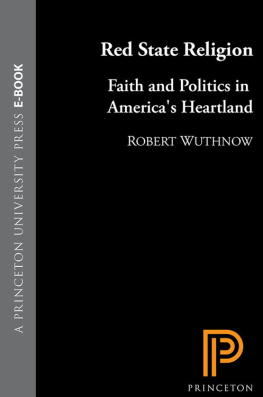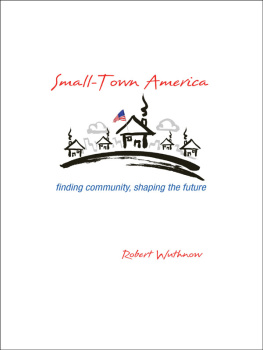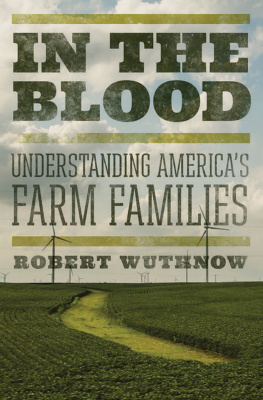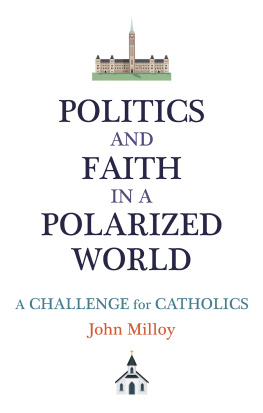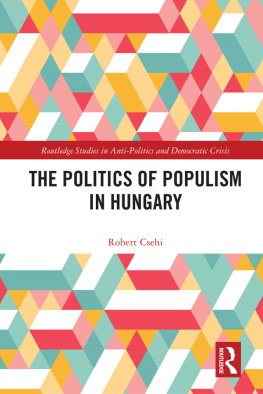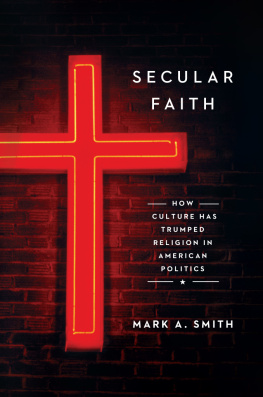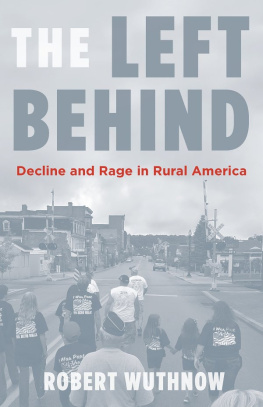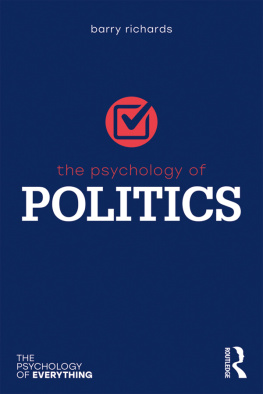RED STATE RELIGION
RED STATE RELIGION

Faith and Politics in Americas Heartland
Robert Wuthnow

Copyright 2012 by Princeton University Press
Published by Princeton University Press, 41 William Street, Princeton,
New Jersey 08540
In the United Kingdom: Princeton University Press, 6 Oxford Street, Woodstock,
Oxfordshire OX20 1TW
press.princeton.edu
All Rights Reserved
ISBN 978-0-691-15055-0
Library of Congress Cataloging-in-Publication Data
Wuthnow, Robert.
Red state religion : faith and politics in Americas heartland / Robert Wuthnow.
p. cm.
Includes bibliographical references and index.
ISBN 978-0-691-15055-0 (hardcover : acid-free paper) 1. Religion and
politicsKansasHistory. 2. KansasPolitics and governmentHistory.
3. Political cultureKansasHistory. I. Title.
BL65.P7W88 2011
306.6'61709781dc22 2011011998
British Library Cataloging-in-Publication Data is available
This book has been composed in Sabon and Century Expanded
Printed on acid-free paper.
Printed in the United States of America
1 3 5 7 9 10 8 6 4 2
CONTENTS
ILLUSTRATIONS
PREFACE
S EVERAL YEARS AGO , I pulled my faded pink and brown Story of Kansas from the shelf and read it with considerably more interest than I had in seventh grade. The states history is replete with tales of bloodshed and sacrifice. John Brown takes his place alongside General Jim Lane and John J. Ingalls. Sockless Jerry Simpson joins Carry Nation and William Allen White. The hall of fame includes Amelia Earhart and Dwight David Eisenhower. Pioneers, farmers, country lawyers, teachers, and merchants settled the heartland. But there were also itinerant preachers, traveling evangelists, priests, nuns, and freethinkers. Mennonites, Quakers, Dunkards, Swedish Lutherans, German Baptists, and vegetarians established colonies. Townspeople built churches by the thousands. People of faith struggled to make their state what they thought it should be. There was no mention of them in the Story of Kansas .
Who, then, would have guessed that Kansas would become a leading player in national controversies about religion and politics? Who would have thought that its churches would encourage thousands of protesters to blockade abortion clinics? That its clergy would work for a stiff constitutional ban on same-sex marriage? That its board of education would be embroiled in controversies about evolution and intelligent design? Or who would have guessed that churches played a different role in the famous Brown v. Board of Education case? In staging civil rights demonstrations? In advocating populism and opposing war? The fact that textbooks said little about religion made it hard to understand these developments.
The thought that someone must have dealt with these topics led me to some interesting discoveries. One of the states most distinguished historians, Kenneth S. Davis, wrote a wonderful novel, The Years of the Pilgrimage , dealing extensively with religion. But the subject barely comes up in his beautifully written Kansas: A Bicentennial History . Craig Miners masterful Kansas: The History of the Sunflower State, 18542000 is remarkably comprehensive, but not the place to find much about religion. Robert Smith Baders plan to follow his authoritative Prohibition in Kansas and tantalizing Hayseeds, Moralizers, and Methodists with a more complete study of Kansas religion was not realized. There have been important essays on specific topics, from Catholic education to Mennonite farming, yet nothing bringing the larger story together.
That larger story remains to be written. What I have attempted here is more modest. This is a book about the changing connections between religion and politics in Kansas from the Civil War through the early twenty-first century. One would be hard-pressed to find any other place that has voted Republican so consistently over a longer period, or has in recent years been as fraught with controversies about faiths relationship with social and moral issues. Kansas is red state America par excellence. But my aim is not to describe Kansas simply as a breeding ground for religious and political conservatism.
Religion and politics in Kansas have had a complicated history. The two came together on numerous occasions to shape policies and public perceptions. But they often remained separate. There were bigots who aroused the ire of eastern intellectuals, but there were fair-minded leaders in Kansas who did everything they could to inhibit bigotry. For every freak who made headlines there were hundreds of ordinary citizens who quietly practiced their faith. Religion and politics did not occur in a vacuum. People struggled on the open prairie to build churches that would be ornaments to their communities. Then as now, politicians saw advantages in favoring one religious perspective or another. Clergy variously condemned and cooperated with one another. Kansans were sometimes at the center of national politics and at other moments far removed. They felt at times as if the entire nation cared what happened in Kansas. At other times, they figured that Washington might as well be on another planet. All that had gone on before them affected the abortion wars at the end of the twentieth century.
Why should anyone not from Kansas be interested? For more than a century and a half, writers have filed reports informing the rest of the country about what was happening in Kansas. At first the stories were about abolitionists and border ruffians. Then the news was of saloon smashers and Populists. Later it was about creationists and abortion protesters. Thomas Franks evocative Whats the Matter with Kansas? captured the attention of a nation wondering if values voters were filled with heavenly delusions. It was one of a long line of works that saw Kansas as an exemplary place in which to probe some important aspect of the American soul. That is one reason to be interested in the history of Kansas religion and politics. Kansans were not so different from many other Americans who lived on farms and in small towns far from either coast. If one wanted to understand small-town America, Kansas was the place. Its citizens were mostly white Protestants and Catholics, traditional families proud of their achievements, concerned about their futures, committed to fiscal conservatism, skeptical of big government, and dedicated to preserving what they regarded as simple moral virtue. These were the grassroots sentiments on which red state America was based.
A broader issue is at stake as well. We are a people constantly on the lookout for what is new. We seize on trends, imagining ourselves to be experiencing something that our ancestors would never have understood, and yet wonder if anything has really changed that much. The question of what is new lies at the core of recent debates about religion and politics. Are we in a new era of moral activists shaping politics? Have religion and politics become more contentious than in the past? Or is the present a continuation of the past? One can find arguments on both sides.
Kansas is an interesting location from which to examine the connections between recent religious activism and the past. The state was dominated by moral politics all along. Prohibition was proposed in 1859, became state law well before it passed nationally, and lasted long after it was repealed. Besides Brown and Nation, archconservative Reverend Gerald K. Winrod made his home in Kansas, as did leaders of the John Birch Society. With these precedents, it was hardly surprising that Kansas became famous at the end of the twentieth century for its schoolbook controversies and antiabortion rallies. Indeed, the state provides rich material for understanding how one kind of activism sets precedents for another. But if there were differencesif recent activism is in fact more pervasivethen Kansas is the place to understand these differences.
Next page
